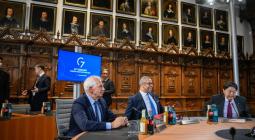Mayors gather in Brussels to showcase how local climate leadership is securing Europe’s future
The EU Covenant of Mayors Ceremony highlights the vital partnership between the EU and its cities and towns to deliver a better future for Europe.
Opened by Roberta Metsola, President of the European Parliament, Ursula von der Leyen, President of the European Commission, and Kata Tüttő, President of the European Committee of the Regions, the event brought together European and local leaders to discuss how local governments’ climate commitments and concrete actions to advance the clean energy transition play a key role in preparing Europe for the future – one that is affordable, prosperous, and crisis-ready.
A critical moment for local climate action
Since its launch in 2008, the EU Covenant of Mayors initiative has mobilised over 10,000 cities and towns of all sizes to commit to the EU’s climate and energy goals, demonstrating how local leadership and bottom-up climate action is driving forward the EU’s bold agenda while leaving no community behind.
This year’s Ceremony, with over 150 mayors and 700 participants from cities and towns all over Europe, reflected the significance of a pivotal year: ten years since the Paris Agreement, one year into a new EU mandate, and just a quarter of a century away from the EU’s climate-neutrality target.
Mayors, regional leaders and local actors came in large numbers to show how – driven by a long-term vision and planning – they remain committed to implementing the EU’s ambitious climate targets on the ground, all the while providing effective responses to current challenges and crises.
From guaranteeing energy security through clean, homegrown power to preparing cities for increasingly severe climate impacts, local climate action is equipping Europe to stay resilient in an ever more unstable world and to protect its citizens from future crises.
For Attila Péterffy, Mayor of Pécs (Hungary) and EU Covenant of Mayors Board Member, who co-opened the Ceremony:
Securing clean and affordable energy for Europe
The Ceremony also hosted the 2025 Covenant of Mayors Awards, recognising three cities’ achievements in decarbonising heating and cooling: Domokos (Greece), Lappeenranta (Finland) and Mechelen (Belgium). Dan Jørgensen, EU Commissioner for Energy and Housing, addressed the winners and participants with a clear message of encouragement:
With fossil fuels still accounting for 70% of buildings’ heating in Europe today, the awarded cities have showcased that having a comprehensive heat strategy at local level is essential to driving an accelerated shift towards cleaner heating.
Beyond ambitious climate neutrality target, this shift in many cities is driven by security and affordability concerns in the face of growing crises. In Finland, Lappeenranta’s proximity to Russia has driven local innovation to accelerate the shift to clean, affordable heat and electricity, while Ukrainian cities like Mykolaiv remain committed to “building back better and greener” to reduce vulnerabilities and dependencies.
All cities highlighted that their strategies rely on adequate capacity and EU support, from investing in clean heat infrastructure and innovation, to building local expertise for effective planning and implementation.
Building resilience: protecting Europe from climate risks
Another key focus was local resilience. Europe is facing intensifying floods, heatwaves and wildfires, threatening people’s livelihood and wellbeing across the continent. Speakers stressed that local governments not only bear the brunt of such events but also possess the best understanding of local risks and responses.
Cities underlined the essential role of European support for their actions not only to boost urban resilience, but to do so in an inclusive way. While for Getafe (Spain), EU funding has been crucial in tackling energy poverty by focusing urban regeneration efforts in vulnerable neighbourhoods, in Reggio Emilia (Italy), EU programmes are helping extend their adaptation measures to the most fragile areas of the city.
As the EU prepares its Integrated Framework for Climate Resilience and Risk Management, participants underscored the need for consistent funding, skilled staff and long-term vision. Deputy mayors of Stockholm (Sweden), Åsa Lindhagen, and of Mannheim (Germany), Diana Pretzell, underlined that the next EU’s Multi-annual Financial Framework (MFF) should be “climate-resilient by design” (Lindhagen) providing “adequate and sustained funding” (Pretzell) for local adaptation efforts.
President of Croatia’s energy agency REGEA, Julije Domac called to put multilevel governance at the heart of the EU’s new resilience framework:
Partnerships for Europe’s future
The event reaffirmed that Europe’s strength lies in aligning all levels of action – local, regional, national and European – towards a common vision. Michele de Pascale, President of Emilia-Romagna region in Italy showcased how their coordination and technical assistance at regional level are helping municipalities plan and implement solutions on the ground.
As highlighted by Hanna Zdanowska, Mayor of Łódź (Poland) and member of the European Committee of the Regions, in her closing address:
At European level, the Covenant of Mayors, together with the EU Missions for Climate-Neutral and Smart Cities and for Adaptation and initiatives such as the Urban Initiative, remain essential guides for this journey. Raffaele Fitto, European Commission Executive Vice-President for Cohesion and Reforms, highlighted when closing the event:
In closing, mayors and regional leaders delivered a united message: Europe’s future will be secured through its towns and cities – a future of European cities and towns “that are vibrant, liveable, sustainable and affordable – that are worth staying in”, as described by Mayor Attila Péterffy.
Cover photo: The European Parliament became the scene of an important gathering on Thursday, 16 October, with hundreds of mayors, local councillors and regional leaders coming from across Europe to reiterate their ongoing committment to the EU’s resilient and climate-neutral future.



